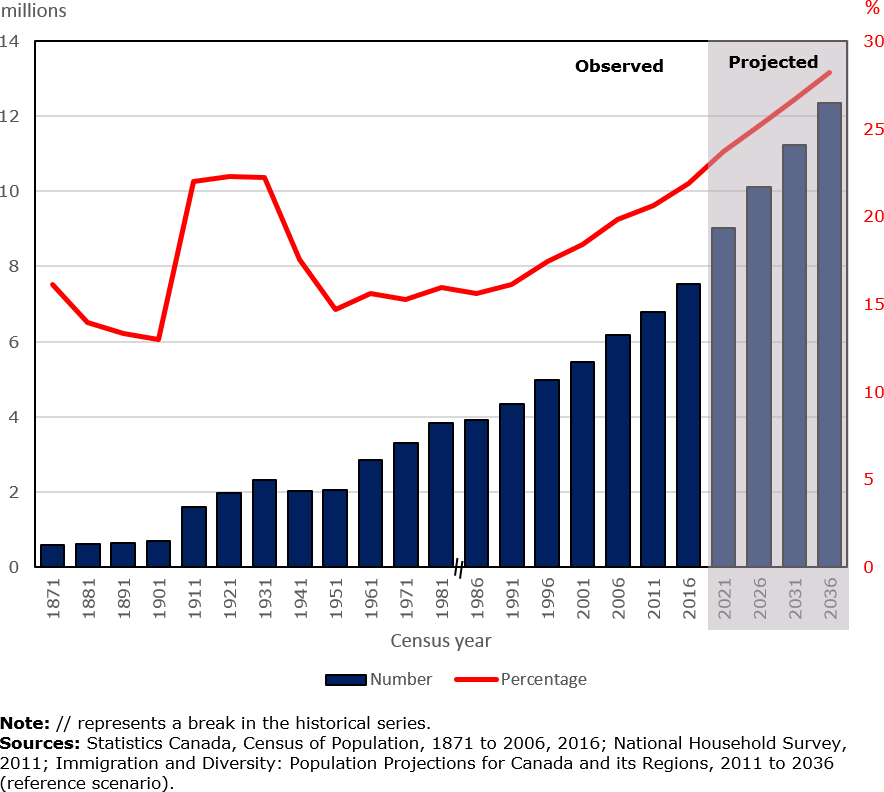Canada is welcoming immigration.

Nav Bhatia, “Superfan” of the NBA winning Toronto Raptors
Recently I was in Canada, including visiting Toronto and eating dinner on King Street the evening after the Raptors won the NBA Title.
I’ve always been fond of Toronto and of Canada, with one of my favourite things being the way they approach immigration as a country.
Canada is showing how to lead on immigration in a way that is positive, affirming, and supports a nation and economy for all of their people.
Canada welcomes immigrants
From a recent article by CIC news:
“Immigrants now make up 46 per cent of Toronto’s population and 51.5 per cent of the city’s residents identify themselves as “visible minority.”
A few days earlier, an article was published in TED Ideas called: “World population is headed for a steep decline, yet Canada’s is growing. What’s its secret?“, noting:
“The less nationalist the state, the easier the job of absorbing immigrants. The weaker the culture, the easier the task of promoting multiculturalism. The less the sense of self, the less the sense that another is the Other.”
I’ve always found Canadians to be accepting and inclusive and to “Other” people who seem different to them (including immigrants) far less than other countries, including England and the USA.
I also like the fact that in Canada the term “visible minority” is used, and having heard it used by leaders who self-define as being from a visible minority, it is a country able to name their differences more easily than (say) in England, hence address where work still remains to be done to further accept the rapid growth in diversity of their population.

Why welcome immigrants?
To quote James Carville, Clinton campaign strategist: “The Economy, stupid.”
The foreign-born population of Canada is now over 20%, trending towards 30% within the next 20 years.
Compare this to the UK, where despite the foreign-born population nearly doubling in the last fifteen years, overall it still is around 14% (Canada is over 20% now), and instead of encouraging immigration as Canada does, the UK is facing growing political populist pressure to cut immigration.
So, why the difference? Simple.
Economics allied to politicians who grasp such realities.
Both Canada and the UK have relatively low birth rates as well as productivity growth, so need immigration to maintain a strong economy.
The difference? Canada and Canadians have long recognised this, the UK seems not to.
Why doesn’t the UK get the value of immigration?
From the TED Ideas article again:
“Canadians embrace refugees and immigrants because they have learned it is in their interest to welcome them. That discovery is part of its DNA”
The article goes on to note about a century of history of the nation of Canada recognising the economic necessity to grow their population by immigration.
Canada is leading on immigration, driven by economic realities and finding success through a national culture that is accepting and inclusive.
To close, this from the TED Ideas article:
“A country of 35.2 million — 5 percent more than there were five years earlier, according to the 2016 census — brings in 300,000 people each year. There’s a push to increase that number to 450,000, bringing Canada’s population to 100 million by 2100.”
An approximate comparison to the UK (population of 66 million) would see a policy to increase annual immigration to around 850,000 people.
The last official numbers on this show net migration to the UK in the last year of 273,000, or less than a third of the Canadian policy rate.
I love being in Canada and experiencing the diversity and inclusiveness of the country.
Also, as someone steeped in Economics and growing businesses and organisations to have the scale of impact to be of benefit to both the organisation and broader society, I’d love to see the UK recognise and embrace immigration rather than the current mood and policy of restricting it.
Why doesn’t the UK get this? I sense it is largely a “British superiority” complex founded on the days of Empire, taught in British schools, books and media as having been a good thing for the world. I won’t get into the fallaciousness of that so deeply spun viewpoint today, yet it does bring some sense to the economic irrationality of being anti-immigration in the UK.
Can the UK learn from Scotland?
Now, I was born in Scotland, a country with deep-rooted inferiority from rule by England since 1707, and one that has seen the confidence of the nation grow since devolution was voted for in 1997.
Scotland does get that they need immigration, perhaps they also have the underdog humility from their hundreds of years of rule by a country ten times their size? Though constrained by UK-wide immigration policy and laws to a large degree, Scotland and the Scottish government are clearly and visibly pro-immigration for the Scottish economy.
I love this video launched on the schedule Brexit day on 29 March 2019. It says a lot.
Oh, and anecdotally, some key Scottish employers are being deluged with applications for jobs at all levels from a country that has always seen a flow of people back and forth across the border, but now there seems to be a strong desire from a high number of people to move in one direction to a country they feel more aligned to, so to Scotland where from? From England.
